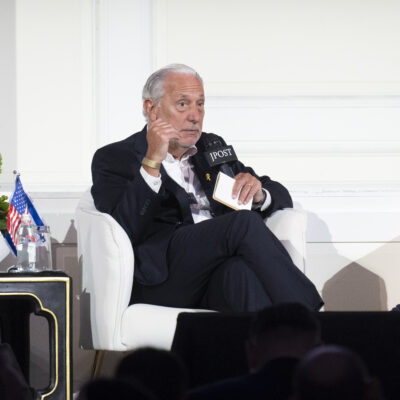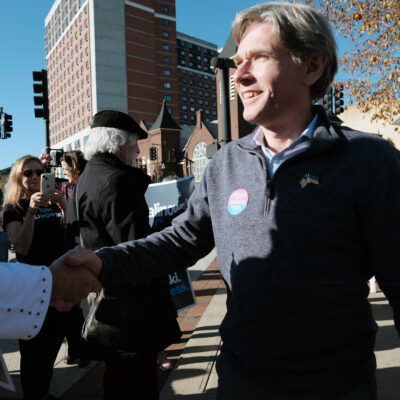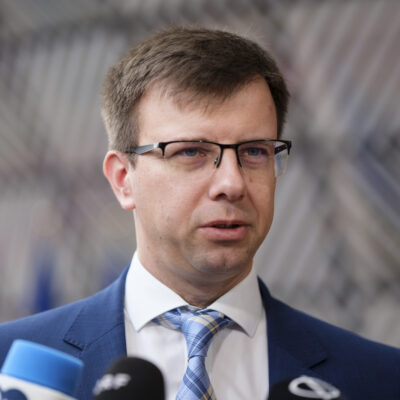
Mohammed Hamoud/Anadolu via Getty Images
Assassinated Hamas leader Saleh Al-Arouri was key conduit between Hamas, Iran
Hamas’ ability to retaliate is limited, but Hezbollah is more likely to seek reprisal, say experts
From the moment Saleh Al-Arouri, deputy chairman of Hamas’ political bureau, described by the terrorist group as “one of the architects” of the Oct. 7 massacre, was killed in a drone strike in Beirut on Tuesday, Israel has been on high alert. With the war against Hamas in Gaza ongoing, plus constant shelling in the country’s north from Hezbollah, which has a massive missile stockpile, the response could come from either direction.
Arouri was an “arch-terrorist,” Dikla Cohen, a research fellow at the Truman Institute for Peace at Hebrew University, said. “His whole life was dedicated to terrorism against Israel.”
Arouri was a key figure in bringing Hamas and Iran closer together. Documents and other evidence uncovered by the IDF in Gaza show how effective Arouri was in that role. Cohen said that Iran’s “fingerprints are everywhere, and at a level that you can understand that they worked together for 12 years…to prepare Oct. 7.”
Arouri and Hamas political chief Ismail Haniyeh met with Iranian Supreme Leader Ali Khamenei in November, asking for Tehran to supply the group with weapons if the war lasts over six months, a Hamas official told The Wall Street Journal. The two were reportedly unsuccessful in convincing Iran to engage in a broader war against Israel.
Arouri’s ties with Iran helped him build Maquar al-Dafah, Hamas’ West Bank command. Tal Beeri, head of research at Alma Research Center, which specializes in analyzing threats against Israel’s north, said that Arouri “was in very close contact with Hezbollah and the Iranians about how to develop Hamas terrorism with better infrastructure, transferring money, weapons sent via Syria and Jordan.”
In the years since he was released from Israeli prison in 2010 as part of a deal, Arouri moved from Jordan to Syria, Turkey, Qatar and Lebanon. It was in Beirut that he developed close ties with Hezbollah leader Hassan Nasrallah, and reportedly was the one to tell him about the Oct. 7 attack on Israel.
Even as he climbed the ranks to become Haniyeh’s second-in-command, Arouri “dedicated the last 12 years to directing murderous attacks against Israel,” Cohen said. “The best known is when he publicly took responsibility in 2014 for the kidnapping and murder of three teens… His death notice was already signed then.”
“If Israel really killed him, as we can likely understand from the kind of drone used, it is a great achievement,” she added.
But Cohen was skeptical that ties between Hamas and Iran would be significantly weakened by the strike: “We learned from the IDF’s findings in Gaza that Iranian involvement [with Hamas] is so deep that assassinating one person is not enough to break it.”
Officially, Israel has not taken responsibility for the strike in Dahiyeh, a Hezbollah stronghold in Beirut.
IDF spokesman Rear Adm. Daniel Hagari said on Tuesday that he was “not responding to what’s being voiced here and elsewhere,” and that “the IDF is on high alert in all sectors for any scenario.”
Yet Mossad Chief David Barnea said on Wednesday that his intelligence organization is “committed to bring the murderers, planners and those who sent them to account. It will take time, but we will reach them wherever they are.”
“May every Arab mother know,” Barnea said, adapting a phrase from a famous speech by first Israeli Prime Minister David Ben-Gurion, “that if her son participated directly or indirectly in the Oct. 7 massacre, his blood [will be shed].”

Other officials asked about the strike have hinted that Israel is trying to avoid a scenario in which Hezbollah enters the war. Hagari said twice in his daily press conference after Arouri was killed that the IDF is “focused on combating Hamas.”
Israeli Prime Minister Benjamin Netanyahu’s spokesman, Mark Regev, told MSNBC on Tuesday that “whoever did it, it must be clear that this was not an attack on the Lebanese state. Whoever did this, did a surgical strike against the Hamas leadership.”
How and whether Iran’s proxy in Lebanon, Hezbollah, will respond to an attack on its Beirut stronghold is the major question emerging after Arouri’s death.
In an address Wednesday night, Nasrallah said that Arouri’s assassination was a “very dangerous development” that “will not remain without response and punishment.”
Regev’s argument, that Israel was targeting Hamas and not Hezbollah, “was something that sounds convincing only to children or cowards,” Nasrallah said.
The Hezbollah leader also warned that if Israel launches a war with the Iranian proxy, it would fight back “with no limits…to the end.”
Trying to predict Nasrallah’s response is “like playing dice,” Beeri said. The Hezbollah leader, Cohen said, “is very unexpected and dangerous, and it is hard to estimate his moves.”
Beeri recounted that, in August, Nasrallah gave a speech in which he said that if Israel attempts to assassinate anyone in Lebanon, whether from Hezbollah, a Palestinian, an Iranian or others, there will be a “severe reaction.” In addition, he noted that Arouri and the Hamas office in Beirut were “under Hezbollah’s sponsorship,” making the strike symbolically against the Lebanese Shia militia, as well. Plus, Beeri argued, Hezbollah wants to “present a narrative of helping to fight the Zionist enemy.”
“Hezbollah wants a war against Israel because it ultimately serves their needs,” Beeri said. “Israel would severely weaken Lebanon in a war, which would make it easier for Hezbollah to take over in an Islamic revolution.”
The strike on Arouri “could be a trigger for a more extreme response that will drag Israel into a war,” he said.
Another possible response from Hezbollah could be a terrorist attack outside of Israel, Beeri said.
Cohen said that “since Oct. 7 Hezbollah has been very measured. They are calculating their steps. The big question is whether they will step out of that box.”
One possibility, Cohen said, was that Hezbollah would continue to attack Israel as it has done in the past three months, but either with larger barrages or with rockets with a longer range. Currently, the terror group is shooting projectiles that reach up to eight km (about five miles) from the border, but it could extend them further, or send hostile aircraft to Haifa and beyond.
At the same time, Cohen posited that internal Lebanese affairs are a major deterrent keeping Hezbollah from escalating its attacks on Israel.
“Christian Maronite leaders say they will not accept any dictates from Hezbollah when it comes to a war. They oppose it deeply because of the very terrible economic situation in Lebanon in recent years…They don’t want Beirut to look like Shejaiyah in Gaza,” she said, referring to a neighborhood in Gaza City in which a major battle of the current war took place in December.
Hamas’ ability to respond to the assassination of Arouri and five others at the terrorist organization’s bureau in Beirut is more limited, experts said. Cohen posited that Hamas may give some indication of its planned response at Arouri’s funeral, scheduled for Thursday at 3 p.m. Israel time.
“The news of Arouri’s killing had significant echoes in all of Gaza,” Cohen said. “Hamas is clearly in deep shock.”
That being said, she added that “Hamas is in great distress because the IDF is closing in on the tunnel system in Khan Younis, where [Hamas Gaza commander Yahya] SInwar and his people are located.”
Cohen noted that Hamas has far fewer rockets thanks to the IDF, but said they will likely continue to shoot what they have and to send out “tunnel rats” to surface and try to attach bombs to Israeli tanks.
She also expressed concern that Hamas may threaten the roughly 130 Israeli hostages it is holding in response.






